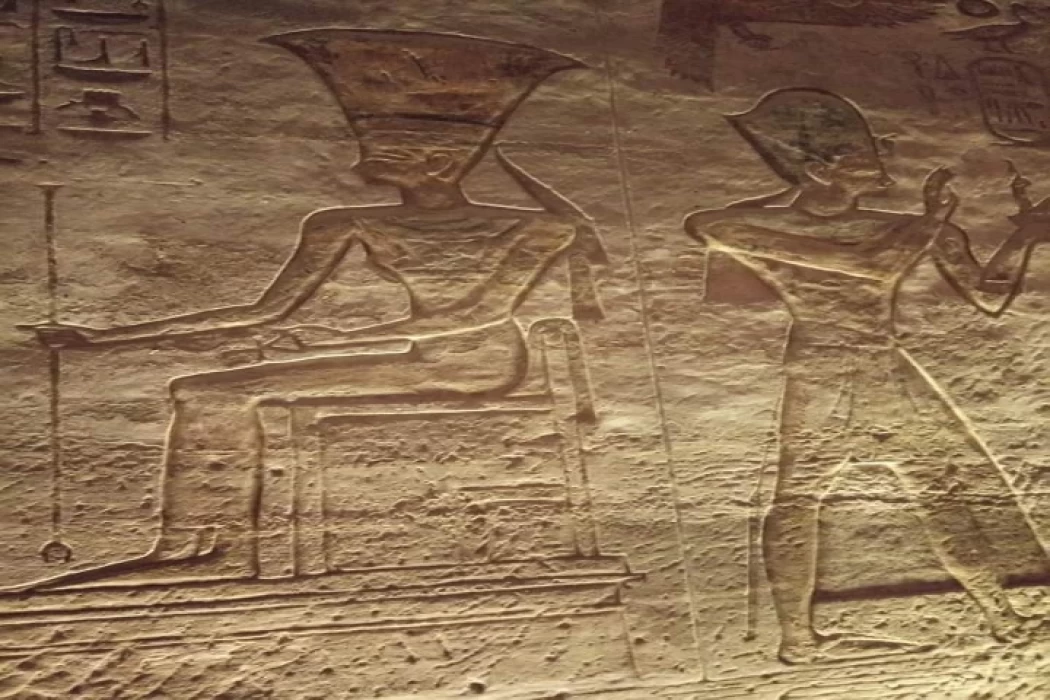
The God Anuket
Anuket was a goddess and the personification of the Nile River in Egyptian mythology in the Levantine at the beginning of his journey in the Egyptian lands and in the regions near Nubia.
Name
In ancient Egyptian its name means "hugging" or "containing" and in Greek, it became nokis (Ανουκις) and corresponded to the Greek goddess Hestia or Vesta.
Worship
Anakat was part of a triad with the God Khnum and the goddess Satis. She may have been a sister of the goddess Satis or she may have been the secondary wife of the God Khnum instead, and Anaket was depicted as a woman with a headdress of erect feathers (which most Egyptologists believe to be a detail derived from the Nubian culture), usually holding in her hand the symbol of Ankh, and had a sacred animal which was a deer.
A temple dedicated to Anakat was erected on the island of Sohail, and inscriptions indicate that a shrine or altar was dedicated to her in this place by the Pharaoh Sepik-hotob III of the thirteenth dynasty, and much later, during the reign of the Eighteenth Dynasty Amenhotep II dedicated a chapel and a temple to her.
During the New Kingdom, the worship of anaket in the two arts included a river procession of the goddess during the first month of the harvest season (Shmu), and inscriptions mention the festival procession of Khnum and anaket during this period.
Anuket (or Anukis, her Greek name) is a Nubian goddess, represented as a lady with a crown of feathers or reeds, with a scepter, and the well-known ankh of Ancient Egyptian culture. Her name means "she who embraces", and she was venerated in Sehel and Elephantine.
The animal that represented her was the gazelle, which symbolized delicacy and tenderness. In this aspect, she was shown as the "mother of the king", suckling the pharaoh as a maternal and protective figure.
She was known as the "ruler of Nubia". She was considered the goddess of lust, because being associated with the Nile, she represented the fertilization of the land by flooding when the river overflowed.
The main center of worship of Anukis, as we know it to this day, was the temple on the island of Sehel, although she was venerated throughout Nubia, in Elephantine, File, Komir, Dendera, and Deir el-Medina.
Every year, the feast dedicated to her took place on the 7th day of the month of God Thoth. It was the moment that coincided with the flooding of the Nile River. In these festivities, it was customary for people to leave as an offering gold, jewels, and precious objects, which were thrown into the water in gratitude for the fertility of the fields.
Part of the custom included gastronomy. On these days, it was possible to eat certain types of fish that were forbidden during the rest of the year.
Religious rituals began with the Ankut festival, when the annual Nile floods began. People threw coins, gold, jewelry, and precious gifts into the river, crediting the water with giving life and the benefits of returning the wealth provided by its fertility to the goddess Ankut. Taboos held in several regions of Egypt against the consumption of certain fish, which were considered sacred, were lifted during this period, indicating that Nile fish species were idolized and used as part of major religious festival rituals.
Anuket's Triad at Elephantine
Like her mother, Satet, Anuket was considered the goddess of hunting animals. According to mythology, Anuket was part of the Elephantine Triad.
The ram-headed fertility deity Khnum, the battle goddess Satet from the Nile flood, and their daughter Anuket, the cataract goddess, made up this triad. Elephantine is situated near Aswan, Upper Egypt, which is on the border between Egypt and Nubia. It was a place of worship for the gods named above. There are other Nile arches in Nubia, which is now Sudan.
When the Nile flooded, the waters entered Egypt via Elephantine. History tells us that Anuket's father, Khnum, guarded and controlled the river's waters... By the 18th century, this place had become a center of worship for the three deities.















